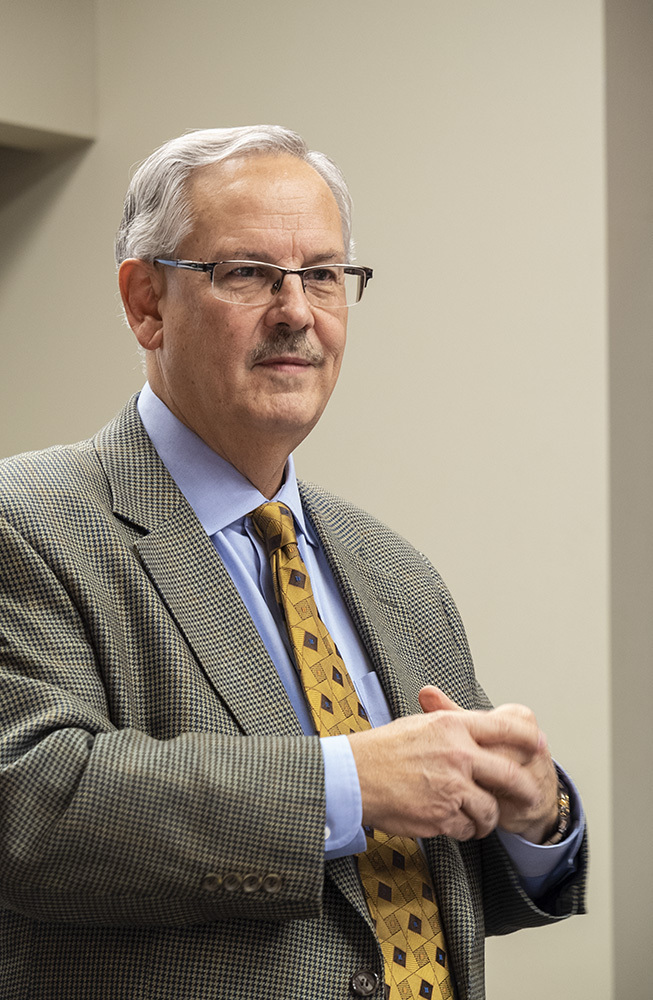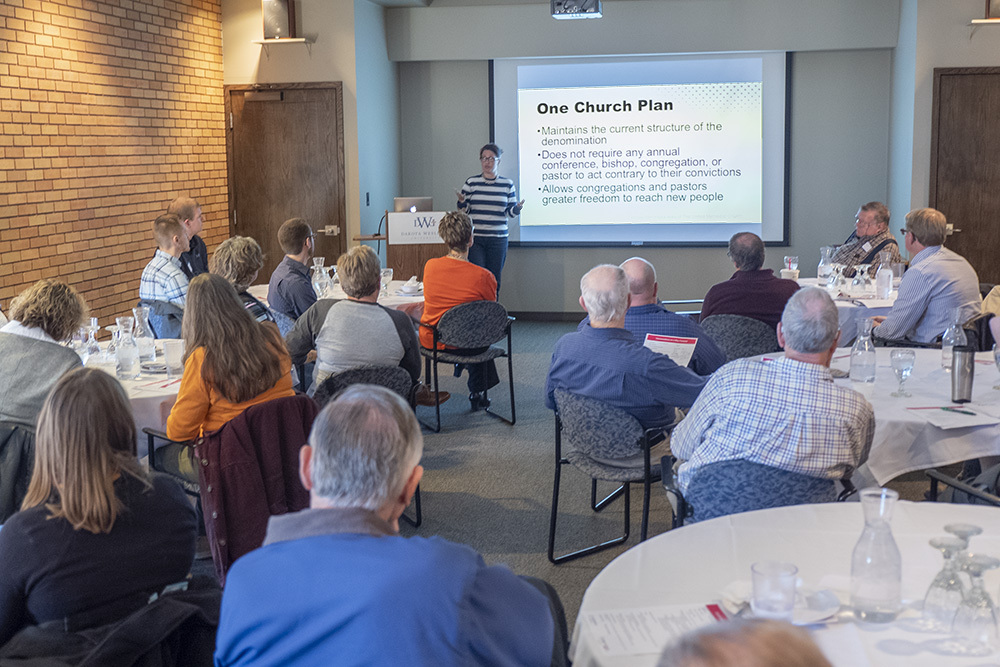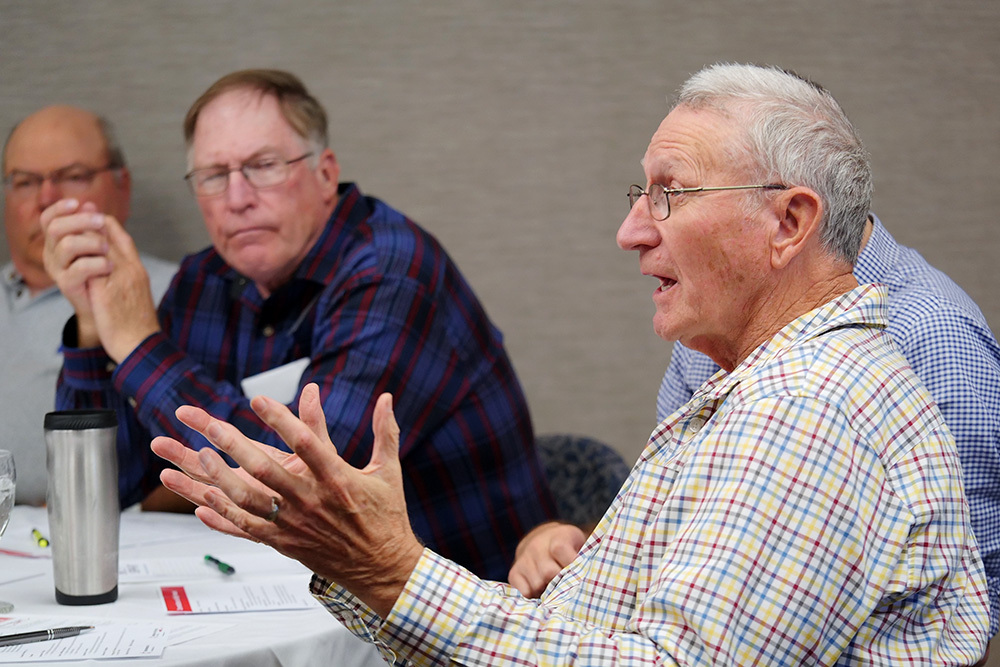
Hundreds gather for conversations on A Way Forward
More than 600 Dakotas United Methodists gathered in eight locations across the Dakotas Conference in October to learn about the possibilities for a way forward for The United Methodist Church around the issue of homosexuality and to share their hopes, dreams, concerns, and questions.
In February 2019, at a Special Session of General Conference (the denomination’s top law-making body), United Methodist delegates from around the world will decide how to move forward as a denomination, specifically related to whether to allow clergy to perform same-sex weddings and whether to ordain self-avowed practicing homosexuals.

Bishop Bruce R. Ough discusses his presentation with those in attendance at the DWU presentation on October 31, 2018. Photos by David Stucke, Dakotas Conference Communications.
Bishop Bruce R. Ough and members of the Dakotas delegation to the 2019 General Conference led the series of “Way Forward” conversations. Part of the goal behind them was to help build resiliency in churches so that regardless of what the denomination decides, they can continue to focus on their shared mission and be the church together. (Watch video of the conversation at Rapid City First UMC on Oct. 30 in three parts—Part I, Part II, Part III .)
'Focus on the mission'
Bishop Ough called those that attended to focus on God’s mission. “The day after the called special session of General Conference 2019, February 27, 2019, God will still be God. I hope all United Methodists will remain focused on the mission of the church — To make disciples of Jesus Christ for the transformation of the world,” said Ough.
The issue is not only about sexuality and the Book of Discipline but about how the church will remain in unity and move forward with the mission. Ough shared, “We tend to forget that God’s mission is there, and we need to stay focused on the mission.”
Ough referenced the narrative in Acts, chapters 10-15, which relates the early church’s struggle with the acceptance and inclusion of “pagan” Gentiles and the Jerusalem Council’s deliberations about whether welcome uncircumcised followers of Jesus. Ultimately, the elders at the Jerusalem Council agreed to issue a letter welcoming uncircumcised followers of Jesus that announced that the “Holy Spirit has led us to a decision that no burden should be placed on you other than these essentials” of discipleship.
Ough told attendees that the way for us to be the church now and in the future is to stay in love with union. Moreover, he said unity is more closely related to the way of the cross than to the way of our worldly power and politics; it is more closely related to Christ’s brokenness and humility than it is our correctness.
“I have come to the conclusion that the solution of the Jerusalem Council was not driven by a move toward loosening accepted codes of conduct or a conviction to be radically inclusive, but by an evangelical and missional commitment to grow the kingdom of God,” Ough said. “Imagine what new missional zeal and evangelistic passion for reaching new generations might be unleashed if we, like the Jerusalem Council, could unbind The United Methodist Church for a truly passionate witness, service, and ministry to all people in every context.”
A Way Forward
At the beginning of the gatherings, attendees read together a covenant for conversation through which they agreed to ask questions, to speak in truth and love, to assume trust and not suspicion, and to speak to be understood and not to convince.
Attendees learned about the Commission on A Way Forward and the process they engaged in to discern with a heart of peace. Participants viewed the video, “A Parable for Today,” to explore the difference between positions that are taken and the convictions that lead us to those positions.

Rev. Rebecca Trefz, the clergy delegate to the special called session of the General Conference, presented and discussed the complexities of the One Church Plan.
Rev. Rebecca Trefz, who serves as the executive director of ministries for the Dakotas Conference and is the clergy delegate to the 2019 General Conference, outlined the three possible plans that the commission came up with and that will be at the forefront of the 2019 General Conference. The Council of Bishops is recommending the “One Church Plan.” (Read about each plan here.) (See a chart summarizing the three plans here.)
After learning more about the three plans that the commission outlined, attendees at each gathering reflected in small groups on what further clarifications they need about the three plans, and how they think their congregations would respond to fulfilling its mission with each of the plans.
At the Rapid City First UMC gathering, attendees shared the following questions and comments: “How do each of the plans work technically? "It seems overwhelming for the person in the pews.” “How can we get beyond this matter and be the church?” “It seems so complicated; how did we get here?”
Bishop Ough reminded attendees that one of the most serious implications in the decision about how to move forward is The United Methodist Church’s connectional mission and witness. “If there is significant division within the life of the church, quite frankly, the victims…will be many of our institutional ministries and much of our global mission,” he told those gathered at Rapid City First UMC. “The United Methodist Church has a God-sized impact in the world. We have a greater impact on doing good in the world than almost anybody.”
Unity

Rev. Phil Lint posed several questions about the plans to be presented at the special called session of General Conference in February, 2019.
Ough emphasized unity throughout the gathering and told attendees, “We know that relationships of trust and a focus on the mission are the things that tend to unite us more than anything else.” Much of work that’s being done around the “One Church Plan” is to maintain relationships and focus on the mission, he said, and he cautioned that language around “exits” should be used carefully so as not to encourage churches to leave.
Toward the end of each gathering, attendees were asked to share their prayers for all of the General Conference 2019 delegates, the Dakotas delegation, and the Bishop. Those gathered were invited to participate in Praying Our Way Forward.
Prayer intentions shared by attendees mentioned they wanted the church to find a way forward by “choosing acceptance,” “showing much grace,” “loving all neighbors,” “acceptance,” and “mission focus.”
Bishop Ough concluded his remarks with a powerful reminder that we can decide in this very moment to be the way forward.
“We are the way forward by the way we treat one other, by the way we love one other,” he said. “We can be the way forward by embracing what we hold in common, by keeping the mission of God the main thing. This debate that has paralyzed us is not the main thing. We can move forward by embracing the reality that we are called to love as God first loved us. This is our witness. This is how we can be the church of Jesus Christ.”
More resources on A Way Forward can be found here.